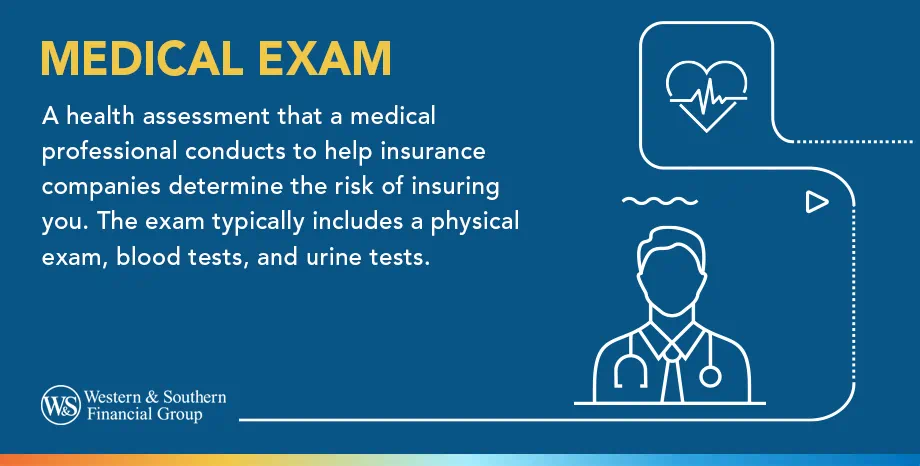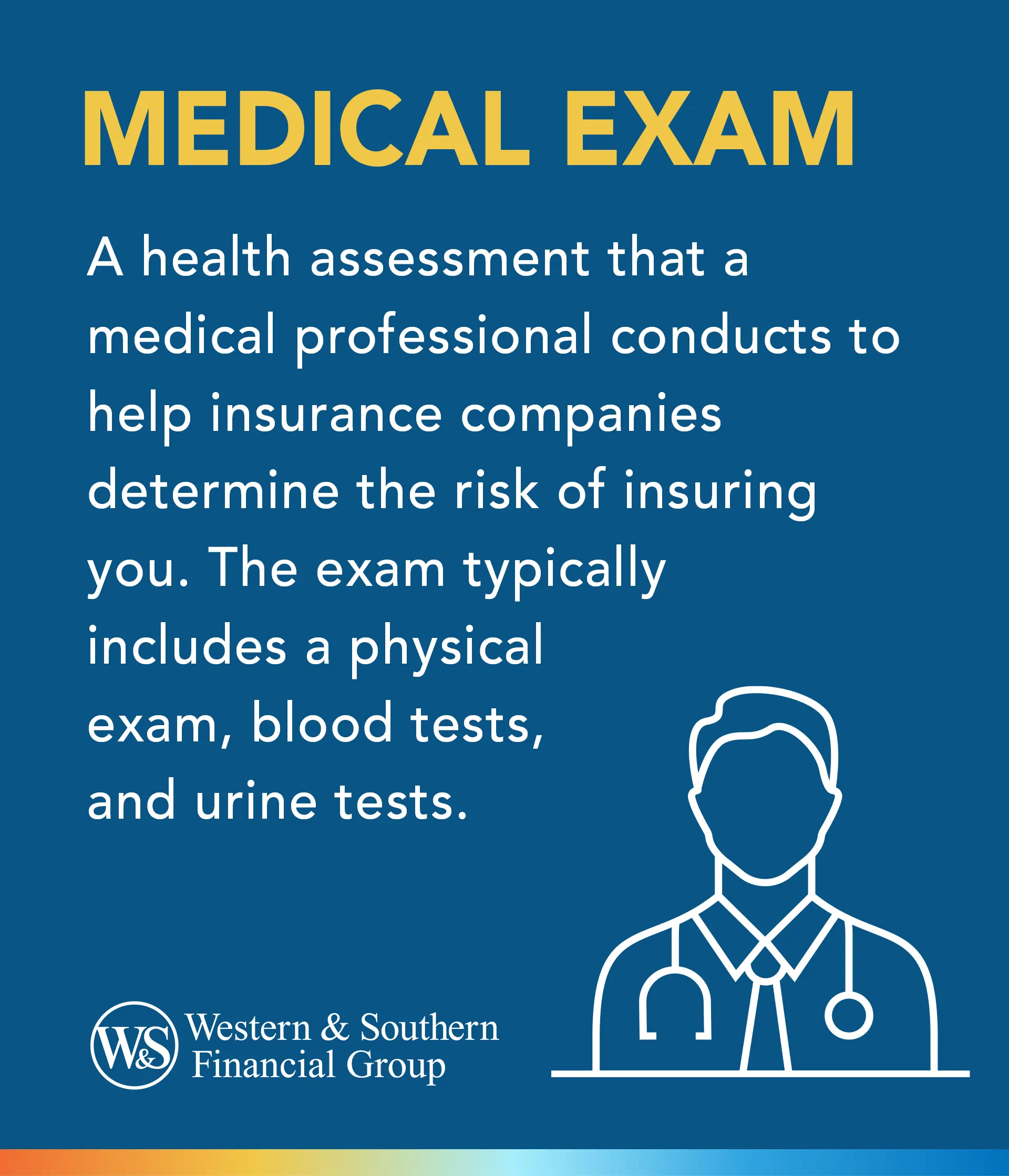

Key Takeaways
- Life insurance medical exams are routine health assessments used to determine risk and pricing.
- The exam typically involves a questionnaire, physical measurements, and blood/urine tests.
- Results influence your eligibility for coverage and the premiums you pay.
- Preparing for the exam can lead to better rates and a smoother experience.
- Alternatives to medical exams exist but may come with higher costs or limitations.
What Is a Life Insurance Medical Exam?
A life insurance medical exam is a health assessment conducted during the life insurance application process. It's designed to evaluate your current health status and help insurers determine your risk level, affecting your policy premiums and coverage options.
Typically, a life insurance medical exam includes:
- Basic health measurements: Height, weight, blood pressure, and pulse rate.
- Blood and urine samples: These tests check for various health indicators, including cholesterol levels, blood sugar, nicotine use, and potential diseases.
- Medical history review: The examiner will ask basic health questions about your personal and family history, lifestyle habits, and current prescriptions.
A licensed healthcare professional, often a nurse or paramedical examiner, usually conducts the exam, which takes 30-45 minutes time. Depending on the insurer's arrangements, it can be done at your home, workplace, or medical facility.
The results of this exam help insurers assess your life expectancy and the likelihood of having to pay out a claim, allowing them to set appropriate premiums for your policy.
Why Do Life Insurance Companies Require a Medical Exam?
Life insurance companies require a medical exam for several important reasons:
- Risk Assessment: The primary purpose of the medical exam is to accurately assess the risk of insuring an individual. By gathering detailed health information, insurers can more accurately predict life expectancy, risk factors, and the likelihood of having to pay out a claim.
- Premium Determination: The medical exam results directly influence an applicant's cost of coverage. Healthier individuals generally receive lower premiums, while those with health issues may pay higher rates or face coverage limitations.
- Customized Coverage: The detailed health information allows insurers to offer more tailored life insurance options that better fit an individual's health profile and needs.
- Fraud Prevention: Medical exams allow insurers to verify application information, reducing the risk of fraud and protecting the company and honest policyholders from fraudulent claims.
- Underwriting Accuracy: The exam gives underwriters objective data, enabling fairer and more accurate policy decisions regarding coverage and pricing.
- Reinsurance Requirements: Many insurers transfer part of their risk to reinsurance companies, which often require medical exam data to agree to take on this risk.
- Early Detection of Health Issues: While not the primary purpose, these exams can sometimes detect previously unknown health issues, potentially benefiting the applicant by encouraging early medical intervention for potential health risks.
- Policy Sustainability: By accurately assessing risk, insurers can ensure they're charging appropriate premiums to maintain the long-term financial stability of their policies and the company.
Understanding these reasons can help applicants approach the medical exam process with less anxiety and a clearer perspective on its importance in the life insurance underwriting process.
Why Do I Need a Medical Exam?
A life insurance medical exam may not be required for everyone, but it's a common step for many applicants. Here's why you might need one:
- Risk Assessment and Pricing: Insurers request a medical exam to assess your health risks, helping them set appropriate premium rates for your life insurance policy.
- Qualifying for Better Rates: Being in good health can benefit you during a medical exam, as it shows the insurer you're a lower risk, possibly leading to better insurance premium rates or coverage options.
- Larger Coverage Amounts: For higher coverage, insurance providers usually require a medical exam to assess your health fully, especially for policies with substantial death benefits.
- Certain Age Groups: Although age isn't the only factor, applicants over a certain age are more likely to require a medical exam due to higher health risks associated with aging.
- Specific Health Conditions: A medical exam may be needed to assess the severity and impact of certain existing medical conditions, allowing the insurer to determine if policy adjustments are required.
Whether or not you need a medical exam for life insurance depends on various factors, including your age, health history, desired coverage amount, and the specific insurer's requirements. If you're unsure, consulting with a licensed life insurance professional can help you explore your options and find the best type of policy for your needs.
What Happens During the Exam?
A healthcare professional will conduct several evaluations during a life insurance medical exam to assess your overall health. Here's what typically happens:
- Medical History Review: You'll be asked about your medical history, including past illnesses, surgeries, prescription history, family health questions, and chronic health conditions.
- Physical Exam: Your blood pressure, height, weight, body mass, and pulse will be recorded to check for immediate health concerns.
- Blood and Urine Tests: Samples of your blood and urine will be taken to test for various health indicators, such as blood sugar and cholesterol levels and the presence of substances like nicotine or drugs.
- Additional Tests: Depending on your age and health history, further tests, such as a noninvasive electrocardiogram (EKG), might be performed to check your heart health.
- Lifestyle Questions: You'll be asked about your lifestyle habits, including your diet, exercise routine, smoking, alcohol consumption, and any high-risk activities you engage in.
The exam is typically 30-45 minutes and is conducted in person by a paramedic or nurse at your home, office, or medical facility. Most insurance companies partner with paramedical companies to perform the exam and do not allow you to use your primary care doctor. The life insurer covers the costs of the life insurance exam.
How to Prepare for the Exam
Preparing for a life insurance medical exam can help you get the most accurate results and potentially qualify for better rates. Here are some practical steps you can take:
Before the Exam:
- Gather Medical Records: Gather recent medical records such as doctor's visits, test results, and medication lists to ensure accuracy when discussing your health history.
- Review Your Medications: List all medications you're currently taking, including prescription drugs, over-the-counter medications, and supplements. Share this information with the examiner during the questionnaire portion of the exam.
- Fast (If Required): Some tests, such as those measuring cholesterol and blood sugar, may require you to fast for a certain period before the exam. Confirm with the examiner if fasting is necessary and how long.
- Hydrate: Stay well-hydrated before the exam to ensure accurate results and ease in providing blood and urine samples.
- Maintain a Healthy Lifestyle: In the weeks leading up to the exam, focus on maintaining a healthy lifestyle. Eat a balanced diet, exercise regularly, get enough sleep, and avoid excessive alcohol consumption.
- Avoid Smoking: Nicotine can impact test results, so avoid smoking for at least a few hours before the exam. If you're a regular smoker, quitting or reducing your smoking habits before the exam can be beneficial.
- Limit Caffeine: Caffeine can raise your blood pressure, so it's best to avoid caffeinated drinks like coffee, tea, and energy drinks before the exam.
On the Day of the Exam:
- Bring Identification: Have a valid photo ID, such as a driver's license or passport, ready for identification.
- Relax: Try to relax and stay calm before the exam. Anxiety can affect your heart rate and blood pressure, so deep breathing exercises or meditation can be helpful.
- Be Honest: Answer truthfully and to the best of your knowledge. Withholding or providing false information can lead to later complications with your coverage.
- Ask Questions: Don't hesitate to ask the examiner any questions you may have about the exam process or the tests being conducted.
Following these suggestions, you can confidently approach your life insurance medical exam, knowing you've done everything possible to prepare for a successful outcome.
What Happens After the Exam?
After your life insurance health exam, several steps occur before you receive your final policy and premium rate:
- Lab Analysis: The samples collected during your exam (blood, urine, etc.) are sent to a laboratory for analysis.
- Underwriter Review: An insurance underwriter reviews your medical exam results alongside your application and medical history. They assess your overall health risk based on lab tests and physical examination findings.
- Risk Classification: You are classified into a risk category based on the underwriter's review.
- Premium Determination: Your insurance risk class dictates your life insurance costs. Healthier individuals generally pay lower premiums.
- Policy Offer: The insurance company will offer you a policy with the determined premium rates and coverage options. You will receive a policy breakdown, including terms, conditions, and exclusions.
- Acceptance or Negotiation: You can accept the policy as offered, request changes, or negotiate terms. If the offered premiums or coverage are unsatisfactory, you can discuss alternatives with your experienced life insurance agent.
- Policy Issuance: Once you accept the policy terms, the insurance company will issue your life insurance policy. You will need to sign the policy documents and make the initial premium payment to start your coverage.
- Ongoing Review: After your policy is in place, it's important to review it periodically. If your health improves or you make significant lifestyle changes, you may be able to negotiate better rates in the future or consider switching to a different policy.
By understanding these steps, you can better navigate the process after your life insurance medical exam and make informed decisions about your coverage.
A life insurance medical exam ensures accurate health information for the best coverage. Get a Life Insurance Quote
Frequently Asked Questions
Can you get life insurance without a medical exam?
If you're looking for life insurance without a medical exam, some options are available:
- Simplified Issue Life Insurance: These policies typically involve a health questionnaire but no medical exam. However, they may come with higher premiums or lower coverage limits.
- Guaranteed Issue Life Insurance: These policies offer life insurance coverage regardless of your health history. However, they tend to have the highest premiums and may have waiting periods before the full death benefit is paid.
These options typically come with higher life insurance rates and lower coverage amounts than traditional underwritten life insurance policies requiring a medical exam.
How do pre-existing conditions affect life insurance medical exams?
Pre-existing conditions can influence the outcome of a life insurance medical exam by prompting additional tests or questions and may lead to higher premiums or modified coverage terms. For some people, pre-existing conditions could limit your ability to purchase a traditional life insurance policy and result in a denial. Alternative options like guaranteed issue life policies may still be available.
Are there ways to improve your health before the medical exam?
Yes, you can improve your health before a life insurance medical exam by adopting healthier lifestyle habits, such as eating a balanced diet, exercising regularly, staying hydrated, and getting adequate sleep. Additionally, avoiding alcohol, nicotine, and caffeine before the exam can help present a more favorable health profile.
What does a life insurance medical exam look for?
A life insurance medical exam looks for key health indicators such as blood pressure levels, cholesterol levels, blood sugar, and the presence of substances like nicotine or drugs. It also assesses overall health through physical measurements, a medical history review, and lab tests of blood and urine samples.


























